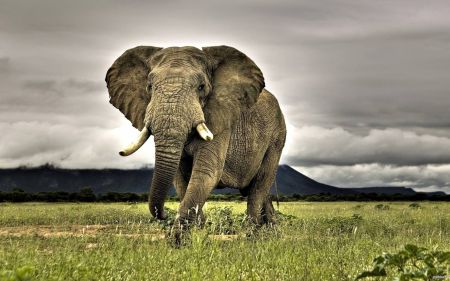

Botswana president Mokgweetsi Masisi recently threatened to ship 20,000 elephants to Germany in an apparent political dispute. This came after Germany's environment ministry had proposed the implementation of more stringent regulations on the importation of hunting trophies.
The suggestion did not please Botswana's president Mokgweetsi Masisi who expressed concerns about the potential negative impact of such stringent regulations on the Batswana people. He said the increase in elephant population can be attributed to successful conservation efforts, while hunting plays a role in maintaining a balanced population. President Masisi said Germans should coexist with the elephants as they are trying to prescribe to them.
"We would like to offer such a gift to Germany," Masisi said, emphasising the seriousness of the offer and his determination to receive a positive response. Botswana has a population of more than 130,000 elephants, accounting for approximately one-third of the global population. These elephants, said Masisi, were wreaking havoc on property, devouring crops, and posing a threat to residents.
The higher population of elephants caused 11, 310 in 2022 of hum-wildlife conflict. It’s not only Botswana that is experiencing the same human-elephant conflict. The neighbouring, Zimbabwe has the second largest elephant population in the world and its parks are nearly overcrowded with elephants due to the country's population of around 100,000. New Zimbabwe recently reported that more than 35 people were killed by wildlife and over 80 were injured countrywide in 2023.
“My ministry is seized with and is in the process of establishing the Human Wildlife Conflict Relief Fund. A point of emphasis to the Hon. Members is that there can never be any compensation for any lost life. I commiserate with the loss of human life in encounters between humans and wildlife,” said Environment Minister Sithembiso Nyoni in parliament.
“However, the communities that live close to national parks face tragedy from the increased wildlife population. To give you a vivid picture Madam Speaker, in Matabeleland North, the elephant population has increased from 49 310 to 61 531. This was from 2021 to 2022 an increase of 12 221 and this was based on an aerial survey.”
The bulk of these elephants were in Hwange National Park and they often destroy people’s crops and worse still kill humans.
“They kill people when they are irritated or encounter people. Government is setting a Human-Wildlife Conflict Relief Fund that will provide relief for the remaining family members of those killed and relief for those injured and maimed,” she said.
“The fund will be managed by ZimParks, our entity with the involvement of the communities. In this regard, we have a programme of community consultation on how they want this fund to be structured, how it will be managed and the design of the necessary modalities for evaluations and technical assessments.”
Solution
As the elephant population increased followed by a growing number of wildlife and human interactions, ZimParks collaborated with the International Fund for Animal Welfare (IFAW) to fit elephants in Hwange National Park with the Global Positioning System (GPS) tracking collars.
These will help the authorities to warn nearby villagers when the elephants are in their vicinity.
“We want to monitor how they (elephants) are moving, how they are using the landscape, where these elephants are going and also what resources they are using. We also want to monitor human-elephant interaction,” The Herald quoted principal ecologist Daphine Madlamoto as saying.
“In this region, our elephant population has increased, the park has the largest jumbo population and the herds tend to move outside the protected area boundaries. Since this park relies on artificial water sources, sometimes the elephants move outside the park in search of water and also in search of forage.”
Botswana had in 2014 decided to ban trophy hunting. It, however, lifted the ban in 2019 due to pressure from local communities. The country implements annual hunting quotas, emphasising the positive impact it has on the local community's income. Communities generated 50 million Botswana Pula between 2021 and 2022 for their developments from hunting quotas.
The Convention on International Trade in Endangered Species (CITES) banned international ivory trade in 1989. It later permitted Botswana, Namibia and Zimbabwe to make a once-off sale of their ivory stocks. The controlled selling of ivory has resulted in Zimbabwe building a stock worth $700 million that it is not allowed to sell. “As an international law-abiding country, we have complied and are being pushed to keep this stock,” said Nyoni.
In a nutshell, Botswana and Zimbabwe have registered successful conservation programmes leading to the growth of the elephant population, which unfortunately leads to a human-wildlife conflict.
When the countries issue hunting quotas they are roundly criticised for animal cruelty, leaving the affected countries in a conundrum: conserve you are damned as human-wildlife conflicts escalate; sell hunting quotas to de-populate the elephants and you are equally cursed.
Even the trading of live elephants is frowned upon as CITES once imposed a temporary ban on such trading.
